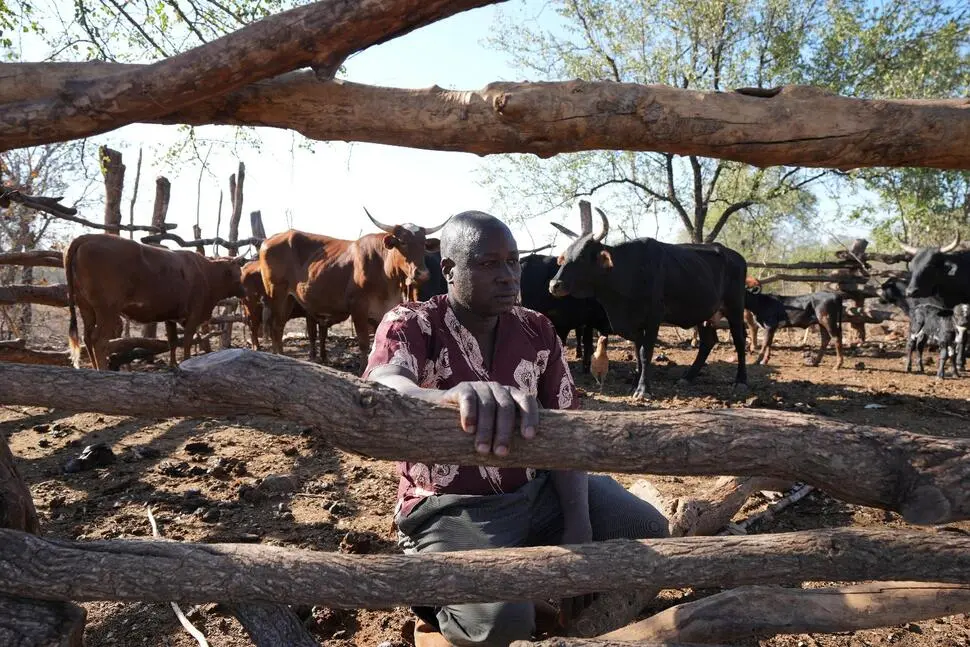CHIREDZI, Zimbabwe (AP) — Amid the thorny bushes of southeast Zimbabwe, Tembanechako Mastick and a group of local men searched for a hyena den that had recently targeted livestock. Scattered goat bones marked the trail, leading Mastick to a deep hole in the earth. He peered inside cautiously, aware of the potential danger but also mindful of a new perspective he now holds.
“While they might have moved from this spot, they’re likely close by due to the abundant food source,” Mastick observed. His companions debated whether to seal the hole or attempt to smoke out the hyenas. In the past, Mastick, a 47-year-old seasoned hunter, would have supported aggressive measures. However, his recent experiences had transformed his views.
Mastick’s shift in perspective began after his arrest late last year for poaching small game in the Save Valley Conservancy, one of Africa’s largest private game reserves. His time in prison, coupled with a rehabilitation program aimed at turning poachers into conservation advocates, reshaped his outlook on wildlife.
“Animals benefit the entire community,” Mastick now tells his fellow villagers. “Killing a zebra might bring immediate gain, but it’s tourism that offers long-term benefits for everyone. Poaching is a selfish act.”
Communicating this message isn’t easy. In Zimbabwe, conflicts between humans and wildlife are escalating as droughts, illegal hunting, and deforestation strain resources. Elephants raid vegetable gardens, and predators like lions and hyenas target livestock—the last line of defense against hunger and poverty exacerbated by El Niño-induced droughts.
Villagers rely on rudimentary fencing and noisy deterrents to protect their animals. The Zimbabwe National Parks and Wildlife Management Authority has reported a surge in distress calls from communities, with numbers rising from 900 in 2018 to between 3,000 and 4,000 annually.
Mastick remembers a time when wildlife coexisted peacefully with his community. “In the past, we rarely encountered wildlife outside of hunting for food. Now, due to land reforms and droughts, we face frequent conflicts,” he reflects, holding a donkey skull—evidence of a hyena attack.
Land reforms beginning in 2000 led to encroachments into wildlife territories, reducing habitats by over 30% in the Save Valley Conservancy. As droughts worsened, wildlife began encroaching on human settlements, leading to increased conflicts.
Dingani Masuku, community liaison manager for the conservancy, links these issues to climate change. “With resources dwindling, humans and animals compete for survival. As resources become scarcer, animals encroach more on human areas.”
In Chiredzi, a semi-arid region about 500 kilometers from Harare, Mastick now works to calm frustrated villagers. His own experience with livestock loss—once owning 45 goats, now reduced to 10—adds weight to his message. Despite personal losses, including attacks from wild animals and his family’s struggles during his imprisonment, Mastick advocates for non-violent solutions.
While in prison, Mastick learned carpentry and now crafts furniture from tree branches and palm leaves. His workshop not only provides a livelihood but also serves as a platform for spreading his message. His efforts have resonated with the community, leading to a reduction in local poaching.
Masuku notes Mastick’s past lends him credibility. “His transformation from poacher to conservation advocate inspires others. His new vocation as a carpenter shows that there are alternative ways to sustain oneself without resorting to poaching.”
As Mastick continues his advocacy and craftsmanship, he remains hopeful for a future where wildlife and communities coexist harmoniously, driven by understanding and mutual benefit rather than conflict.
